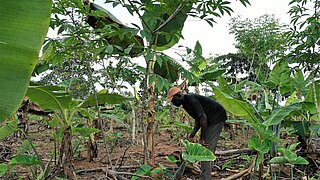From full sun to shaded cocoa agroforestry systems: Rehabilitation of smallholder cocoa farms and forest ecosystems for enhanced conservation and sustainable use of forestry resources in the High Forest zone of Ghana
Deforestation, caused by the expansion of plantations, low productivity, food insecurity and an unregulated forestry sector, is a real threat to Ghana’s High Forest Zone. This project is therefore funding the retention and sustainable use of forest resources in the Ghanaian High Forest Zone. By working with cocoa businesses, smallholders and the local authorities, the project aims to rehabilitate degraded smallholder farms and forest ecosystems. The project also helps companies establish deforestation-free supply chains. Strategic planning programmes are also being implemented, and a system for land use planning is being developed that will enable local authorities to achieve a better balance between cocoa farm expansion and forest conservation. The project is also working on measures to achieve the widespread, ecologically intact and community-focused rehabilitation of smallholder-centric agroforestry systems (using native tree species).
- Countries
- Ghana
- IKI funding
- 2,193,416.00 €
- Duration
- 01/2016 till 12/2021
- Status
- completed
- Implementing organisation
- SNV Netherlands Development Organisation - Ghana
- Political Partner
-
- Forestry Commission - Ghana
- Implementing Partner
-
- Cocoa Research Institute of Ghana
- Forestry Commission - Ghana
State of implementation/results
- Project completed.
- Over 1,800 beneficiary farmers are adopting cocoa agroforestry systems using recommended shaded trees in 25 communities.
- Four community nurseries were established which produced over 2.4 million planting materials including cocoa seedlings, plantain suckers and indigenous tree species. Over 70% of beneficiary farmers are registered with either RA/UTZ or Fairtrade certification.
- The project has developed land use plans for 15 communities covering a total area of 29,000 hectares.
- The Ghana Cocoa Health and Extension Division (CHED) donated 264 litres of foliar fertilizer and 24 litres of insecticides to farmers that have replanted their cocoa farms under the project. A total of 180 farmers benefited from the input distribution and got training on the proper application of the fertilizers.
- A reserve encroachment remediation committee made up of ten influential traditional leaders has been established to help address the high incidence of farm encroachment into Krokosua Hills Forest Reserve located in Juabeso district (adjacent Bia West district).
- As part of efforts to enhance opportunities for access to finance for smallholder cocoa farmers, SNV has established a partnership with Solidaridad West Africa (SWA) in order to jointly establish and increase the number of village savings and loans associations in Juabeso-Bia landscape.
- Land use plans and constitution have been developed for two community resource areas (CREMAs) bordering the Bia National Park (BNP) and the Bia North Forest Reserve (BNFR). An overarching management plan has been developed to guide community efforts in sustainable management of their natural resources in the two CREMAs.
- The project in partnership with Touton (a private partner) and technical support from Satelligence, a remote sensing and forest monitoring firm, have been able to delineate cocoa from open forest, identify various shades of cocoa agroforest, detect deforestation associated with cocoa, and locate illegal cocoa farms in forest reserves.
- Five private companies have expressed interest in utilising land use/cover change maps developed under the project to monitor no-deforestation in their supply chain.
- SNV and the Centre for International Forestry Research (CIFOR) conducted field surveys to evaluate the early impacts and barriers to adoption of climate smart cocoa.
- The development of the geoportal for the National Forest Monitoring System has been initiated as a collaboration between Forestry Commission, Palladium’s Partnership for Forest Programme and the project.
- The project in partnership with Centre for Remote Sensing and Geographic Information Services (CERSGIS) of the University of Ghana, organized a training workshop on using cloud-computing technology for satellite data processing. The training workshop aimed to enhance capacity of GIS experts at national level in Google Earth Engine (GEE) to enable quick access to and analysis of large-scale satellite data through cloud computing technology.
- A solar powered irrigation system has been installed covering selected replanted farms to demonstrate the benefits of providing optimum moisture to in smallholder cocoa systems. The installation covers a total two hectares of cocoa farm, with a potential for other farmers to extend the drip system that delivers optimum water supply to cover five hectares of cocoa farm.
- 20 cocoa farmer cooperatives have been established with 50 memberships each. These cooperatives were trained in group dynamics, financial literacy, village savings and loans (VSLA) concepts, and are linked to licensed buying companies (LBCs).
- Value chain assessment of cocoa “companion” crops was conducted on plantain, cassava and permanent economic shade trees in cocoa agroforestry system. The assessment aims to establish the dynamics and profitability of these “companion” crops in cocoa agroforestry systems as well as potential to further develop these value chains as viable livelihood support for farmers renovating their overaged cocoa farms.
- A total of 432 farmers benefitted from the cocoa hybrid seedlings and permanent shade trees raised, to plant an area of 626 hectares. All these farms have been mapped and basic farmer profile information compiled.
- Further, a total of 958 farms rehabilitated in 2017/18 cropping season were inspected.
Latest Update:
04/2024
Project relations
Legend:
The link has been copied to the clipboard





